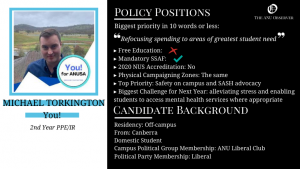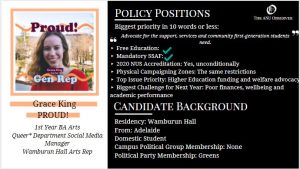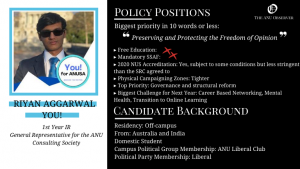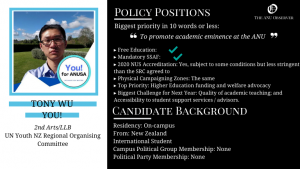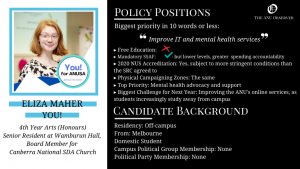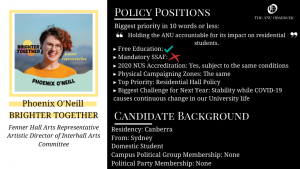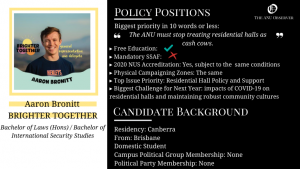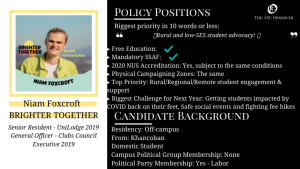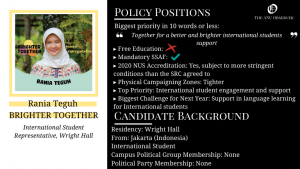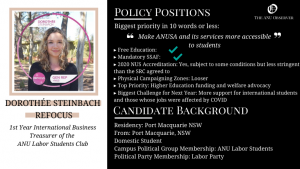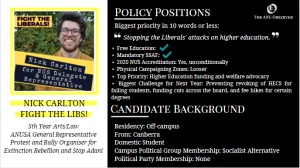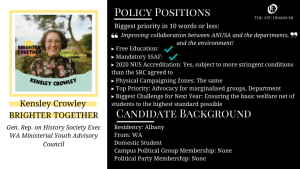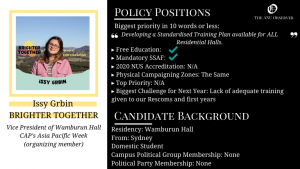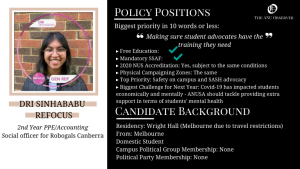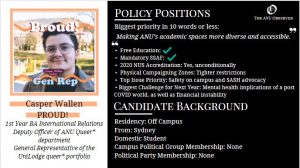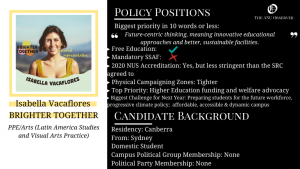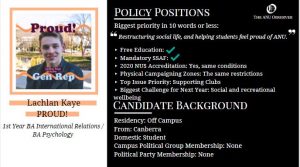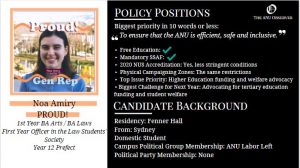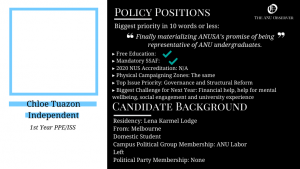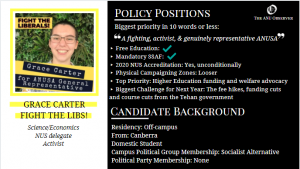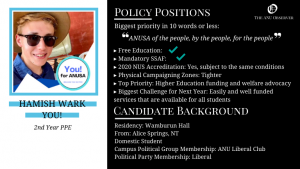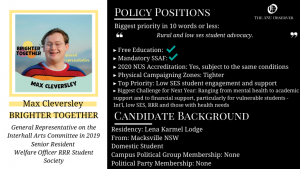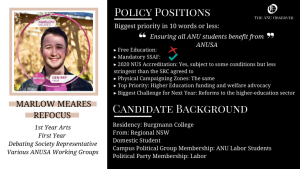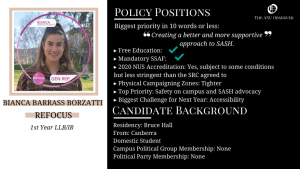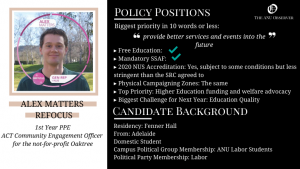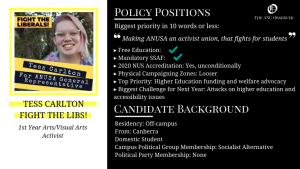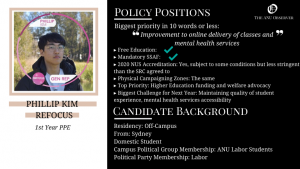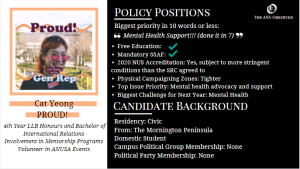ANUSA Election: Gen Rep Profiles

By Sam Wright, Vienna Daniels, Brandon How, and Keeley Dickinson.
Content warning: some profiles contain mention of sexual assault and sexual harassment.
48 students are running for the position of ANUSA General Representative. 14 candidates will be elected, using the same voting system as the Australian Senate. This means that how you vote is important, right down to your last preference. But how can you possibly compare over 40 candidates? Observer has prepared profiles with consistent information to help you do just this.
What do Gen Reps do?
The 14 Gen Reps make up the largest single voting bloc on the SRC and so can wield a lot of clout over the executive. Generally speaking, if there is an ‘Opposition’ within the SRC in any year, it is usually driven by prominent and outspoken General or College Representatives.
Besides voting on the SRC, Gen Reps’ only defined role is to promote ANUSA’s advocacy. Given the vacuum of clear responsibilities, Gen Reps perform a variety of roles and are generally driven by their particular interests. Some scrutinise the actions of the Executive, and keep them accountable for their actions. Others aim to further their policies, passing motions and lobbying at SRC. Some embark on particular projects. Still other Gen Reps are just generally helpful, volunteering to run ANUSA barbeques and events.
How did you get this information?
Observer sent out a survey to all of the 48 candidates for Gen Rep in this year’s ANUSA elections. We collated their responses into info cards for each candidate, including their recent experience, background, and some policy priorities. We hope that these cards will help you inform your vote.
The ordering of the cards is randomised each time the page is loaded. We have not included those candidates who did not respond. Clicking on a card will open it in a new tab.
What do the questions mean?
- The question regarding National Union of Students (NUS) accreditation relates to the accountability and transparency-based Key Performance Indicators which the SRC sent to the NUS earlier this year.
- The question on physical campaigning zones relates to the exclusion zones which were recently amended due to the redevelopment. The exclusion zones, which can be found in Schedule B to the ANUSA Constitution, prevent candidates from campaigning in several areas, including all of Kambri.
- The question on mandatory SSAF relates to the Student Services and Amenities Fee, which is a mandatory $300 fee students pay each year to pay for student services such as ANUSA.
- We gave the candidates a list of 12 issues that Gen Reps commonly focus on, and asked them to rank how they would prioritise these. We have included the issue they labelled as their highest priority.
- We asked the candidates to describe their biggest priority as a Gen Rep in 10 words or fewer. Some of them went over the limit – we strictly cut them off, and have marked this with an ellipsis.
- We had the candidates tell us what they anticipate the greatest challenge confronting undergraduate students will be next year.
Disclaimer: This is not a perfect summary. It won’t tell you anything about the character, competence or commitment of any of the candidates, and there are certainly great differences between candidates in all those areas. What it can tell you is which candidates agree with you on some of the most contentious issues facing ANUSA, and give an insight into how much their priorities match yours. Our recommendation is that you look at the candidates whose policies intrigue you, go check out their pages yourself, and see what you think.
Thank you to all the candidates who gave us your info! And if you’re still needing more information to decide, stay tuned for our further Gen Rep coverage.
Reporting from former Observer Editor Eliza Croft was incorporated into the text of this article.
- Michael Torkington – You!
- Frank Hooper – Brighter Together
- Grace King – Proud!
- Riyan Aggarwal – You!
- Tony Wu – You!
- Elijah Smith – Go the Distance
- Eliza Maher – You!
- Phoenix O’Neill – Brighter Together
- Max Evans – You!
- Aaron Bronitt – Brighter Together
- Niam Foxcroft – Brighter Together
- Rania Teguh – Brighter Together
- Dorothée Steinbach – Refocus
- Nick Carlton – Fight the Libs!
- Kendall Jiao – Brighter Together
- Harry Colquhoun – You!
- Kensley Crowley – Brighter Together
- Issy Grbin – Brighter Together
- Dri Sinhababu – Refocus
- Casper Wallen – Proud!
- Isabella Vacaflores – Brighter Together
- Jenson Barker – You!
- Avan Daruwalla – Brighter Together
- Lachlan Kay – Proud!
- Coby Howell – Proud!
- Noa Amiry – Proud!
- Chloe Tuazon – Independent
- Grace Carter – Fight the Libs!
- Neha Kalele – Brighter Together
- Hamish Wark – You!
- Max Cleversley – Brighter Together
- Isha Singhal – Proud!
- Jaya Ryan – Go the Distance
- Mekala Navaratne – Go the Distance
- Marlow Meares – Refocus
- Saad Khalid – A New Way Forward
- Claire Noack – Brighter Together
- Bianca Barrass Borzatti – Refocus
- Lilian Law – You!
- Destiny Harding – Brighter Together
- Alex Matters – Refocus
- Tess Carlton – Fight the Liberals!
- Phillip Kim – Refocus
- Cat Yeong – Proud!
